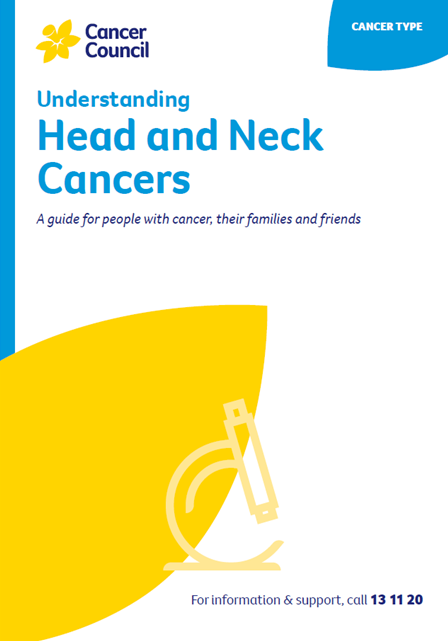- Home
- Head and neck cancers
- Managing side effects
- Vision changes and hearing loss
Vision changes and hearing loss
Head and neck cancer and its treatment can sometimes lead to vision changes and hearing loss.
Vision changes
If the cancer is in your eye socket, the surgeon may have to remove your eye (orbital exenteration). The empty eye socket will be replaced by a sphere of tissue from another part of your body. This keeps the structure of the eye socket.
Later you can be fitted for an artificial eye, painted to look like your other eye and surrounding tissue. The eye is like a large contact lens that fits over the new tissue in the eye socket.
You will still be able to see with your remaining eye, but your depth perception and peripheral vision won’t be as good. The physiotherapist and occupational therapist can assist you to manage any changes to your vision after surgery. You will usually still be able to drive and play sport, but it may take time to get used to the changes.
Before you start driving again, tell your driver licensing authority about the changes in your vision, as there may be restrictions you have to follow. The licensing authority may ask for information from your doctor to decide if you are medically fit to drive.
Hearing loss
Ask your treatment team whether you are at risk of hearing loss and if you should have your hearing tested after treatment ends.
| Chemotherapy | Some drugs can cause hearing loss. The first sign may be ringing in the ears (tinnitus), so tell your doctors if you notice this. |
| Radiation therapy | This can damage the internal structure of the ear, cause fluid build-up behind the eardrums and lead to loss of hearing. |
| Surgery | Some surgeries, especially for nasopharyngeal cancer, can cause temporary or permanent hearing loss. |
Podcast for people affected by cancer
Listen now
More resources
A/Prof Martin Batstone, Oral and Maxillofacial Surgeon and Director of the Maxillofacial Unit, Royal Brisbane and Women’s Hospital, QLD; Polly Baldwin, 13 11 20 Consultant, Cancer Council SA; Martin Boyle, Consumer; Dr Teresa Brown, Assistant Director Dietetics, Royal Brisbane and Women’s Hospital, Honorary Associate Professor, University of Queensland, QLD; Dr Hayley Dixon, Head, Clinical Support Dentistry Department, WSLHD Oral Health Services, Public Health Dentistry Specialist, NSW; Head and Neck Cancer Care Nursing Team, Royal Melbourne Hospital, VIC; Rhys Hughes, Senior Speech Pathologist, Peter MacCallum Cancer Centre, VIC; Dr Annette Lim, Medical Oncologist and Clinician Researcher – Head and Neck and Non-melanoma Skin Cancer, Peter MacCallum Cancer Centre, VIC; Dr Sweet Ping Ng, Radiation Oncologist, Austin Health, VIC; Deb Pickersgill, Senior Clinical Exercise Physiologist, Queensland Sports Medicine Centre, QLD; John Spurr, Consumer; Kate Woodhead, Physiotherapist, St Vincent’s Health, Melbourne, VIC; A/Prof Sue-Ching Yeoh, Oral Medicine Specialist, University of Sydney, Sydney Oral Medicine, Royal Prince Alfred Hospital, Chris O’Brien Lifehouse, NSW.
View the Cancer Council NSW editorial policy.
View all publications or call 13 11 20 for free printed copies.

